This is part 1 of a 5-part travel series on Ubud where I share things to note as a foreigner living in Ubud and how to make the best out of your trip here.
- Part 1: Living in Ubud Series: Introduction, Visa, Accommodation
- Part 2: Environment: Nature, Climate, Villages, Animals
- Part 3: Transport: Scooters, Taxis, Go-Jek
- Part 4: Food: Vegan & Vegetarian Restaurant Reviews
- Part 5: Others: Insects, Language, Internet Speed, and More (Conclusion)
A while back in May 2016, I visited Ubud, stayed there for a month, and fell in love with the place. I thought I should write a guide to share this amazing place with those of you who may be interested to visit next time! :)
Update Dec 2018: I have since returned to Ubud for a month and have updated this series with new insights. :)
Why I Went to Ubud
While many visit Ubud to get away from work, I came to Ubud to work. Not to attend work meetings, but to get stuff done. Singapore was killing me with the endless droves of people, the stressed-up climate, and the consumerism that’s everywhere. Noise pollution is also a serious issue here with construction almost everywhere. The endless high-rise buildings were also beginning to feel claustrophobic for me.
Within a few weeks here, I was able to reconnect with my inner self and get stuff done. The boundless nature and serenity make it easy to get in the flow and create content. While I was struggling for weeks to write an article in Singapore, by the end of my stay in Ubud, I had a series of articles and podcasts lined up to publish on the site.
Why Ubud?
My criteria for my getaway spot were
- Affordability;
- Located in a neighboring country so I could easily return home if need be;
- Affordable private accommodation (i.e. Airbnb) that I didn’t have to share with anyone, so that I would have private space to get things done;
- Adequate nature and space, meaning a manageable density of people. Coming from Singapore, any place other than Hong Kong and Tokyo would be an improvement; and
- Bonus: Lots of nature.
I thought of Langkawi but I’ve been there before and the lodgings are overpriced resorts not meant for an extended stay. I thought of Chiang Mai but there was a haze issue going on then; apparently, this happens every March to April. (Update: I subsequently stayed in Chiang Mai during Feb-Apr 2017 and while it has a bustling vegetarian scene, I find it much more commercialized than Ubud.)
Then I thought of Ubud. I’ve heard good things about Ubud before but never visited the place. After researching, I realized that Ubud is the perfect spot. And indeed it is!
Ubud: A Cultural Hub
Ubud is a quiet town rich in nature and is a mecca for veganism, yoga, arts, and spirituality. It is known for being the cultural hub of Bali and has dense forests, small farms, and rice paddies.[1] With a population of about 34,000 people[2], there is absolutely no issue of congestion here.
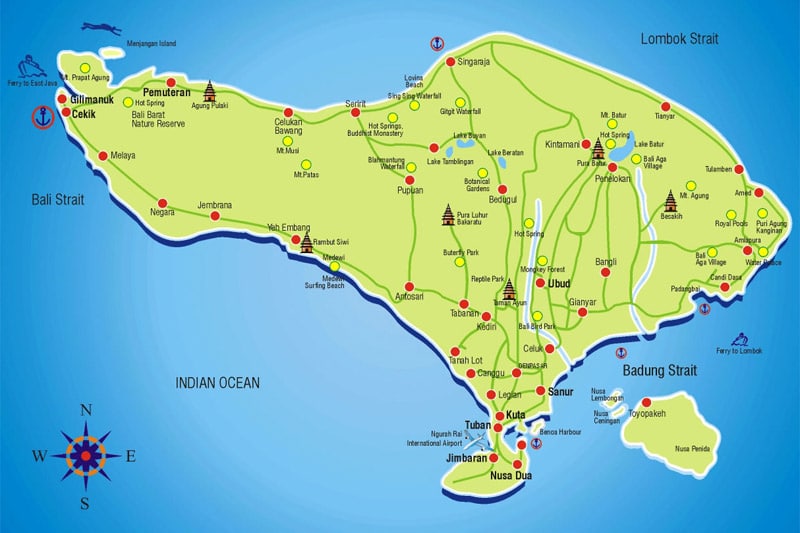
Map of Bali Island. Ubud is at the center-southeastern part (can you see it?)
Ubud shouldn’t be confused with Kuta, Legian (famous for its beach), and Seminyak (famous for shopping, bars, cafes) which are considered the touristy parts of Bali. These areas are south of Ubud. While some people may like these places, I have been there before and I’m honestly not a fan. My husband and I were in Seminyak during our honeymoon in 2014 and we had three encounters of being conned in our few days there — ranging from a taxi driver who silently smiled and pocketed the excess cash when we gave him the wrong amount, to a K-mart store clerk who quoted a false total for our purchases. After researching online, I realized that tourist conning is a norm in Kuta/Seminyak, even with money changers.[3][4] Search “Bali money changer cheat” on Google and you’ll know what I mean.
A local told me that conning is common in Kuta/Seminyak because many people working in those areas are not local Balinese but folks from other regions. They are just there to earn money and brought along bad practices such as tourist conning. That’s a shame as it really does give Bali a bad rep.
Don’t get me wrong: I’m sure Kuta/Seminyak is great with nice shops and honest people. The hotel we stayed at had great staff, for example. I’m just not a fan of being constantly on guard against dishonest people.
In Ubud, people are more down to earth. There are still dodgy people, of course, and I found this to be common among transport drivers in Ubud Center. As I’m not local, the drivers would quote very high and unreasonable rates whenever I tried to book a ride, after which I would need to haggle (more on transport in part 3). When I was buying a prepaid SIM card in Ubud Center, the clerk initially quoted me price X but suddenly changed and told me to pay a higher price after installing the card in my phone. This profiteering spirit is much worse in Kuta/Seminyak, but I have noticed some elements of it in Ubud.
If you live in the countryside, you’ll meet more down-to-earth people, though most of them don’t know English so you can’t speak with them anyway. Even then, there are people who run commercialized tourist operations in the countryside who will try to profiteer from you. I general, I have noticed a “me vs. you” mentality in the local community: if you are a foreigner, they will treat you differently and see you as a source of income, rather than someone to help out.
By the way, this guide has no information on tourist sites since I came here to work. I find Ubud a great place to rejuvenate, get close to nature, and get things done. Rather, you’ll find this guide helpful in terms of things to note when living here.
Length of Stay and Visa Policy
In general, there are four main ways to enter Indonesia that apply to most people traveling as a tourist or for social purposes:
- No visa required — Applies to the majority of countries including Singapore. Free entry, valid for 30 days, NOT extendable.
- Visa on arrival — You pay and get this upon arrival at the Indonesia airport. Costs USD 35, valid for 30 days, extendable once for 30 days.
- Visa needed — You need to apply for this at your local (or overseas) embassy before going to Indonesia.
- Hidden Option — 60-Day Tourist Visa. Apparently, you can apply for a 60-day tourist visa. You need to apply this at your local (or overseas) embassy before going to Indonesia. This is more troublesome than Options 1 and 2 but gives you the option to stay in Bali for as long as 6 months as you can extend the visa four times (for 30 days each) when you are in Bali. More information below.
To see which option applies to you, go here. Note
- Your passport must be valid for at least 6 months from the date of arrival.
- The day of arrival counts as one day while the day of departure counts as another day.
- If you’re going in with no visa (Option 1), your trip isn’t eligible for an extension. You can only stay for 30 days and then get out.
- To stay longer, you need to deliberately apply for a Visa on Arrival (Option 2) despite not needing a visa, after which you need to apply for a visa extension (of 30 days) while inside Bali. Or you can apply for a 60-day Tourist Visa at your local (or overseas) embassy before entering Indonesia.
- If you’re going for Visa on Arrival (Option 2), you are eligible for a one-time extension of 30 days. Read this page and this page on how to do so. Note that you should extend your visa at least seven days prior to its expiry. Don’t wait until the last minute as the Indonesian embassy isn’t known for its speediness!
- If you’re going for a 60-day Tourist Visa (Option 4), you are eligible for four separate visa extensions of 30 days each. This is the best option if you want to get the longest stay in Bali without leaving. Read this page on how to do so.
- I couldn’t find any official rule about how long you must be out of Indonesia before you can return. If you are a daredevil, you can do a visa run — get a plane ticket to a neighboring country (Singapore is the most popular destination), then return to Indonesia on a same-day flight.
But they are starting to clamp down on this in Singapore. There have been stories of people getting sent back to Indonesia for such visa runs, though these stories are still few and far between. Just know that if you try something like this, there’s a risk of being caught as it’s obvious what your plan is.
Since I’m on a Singapore passport, I fall under Option 1 and don’t need a visa. I decided to make the best out of my trip each time and stayed for close to a month.
Upon arrival at Ngurah Rai International Airport (aka Denpasar International Airport — it’s the only airport in Bali), I simply went to the immigration desk, got clearance, filled out a customs declaration (mandatory for all foreigners), got my bags scanned one last time, and was done. The officers were nice and friendly. None of that crazy experience like at the US customs — I swear that experience has permanently scarred me and how I view immigration checkpoints today. -_-
Accommodation (for 2016)
Since I went to Ubud to get alone time to work, the quality of my accommodation was crucial.
So I spent the most time researching where to stay. I searched HostelWorld.com and realized that they only let guests book for a maximum of 14 days for whatever reason. And booking a hostel, even if I were to get a private room, would mean constantly hearing footsteps along the corridor, dealing with a high turnover of guests, and hearing people talk loudly at night. Having stayed in many hostels in my 20s, I wasn’t keen on that.
Hotel is definitely out — staying for a month at a hotel would be way too expensive.
I thought of Airbnb. After a quick search, I realized that there is a healthy selection of places at good prices! For example, you can get a whole villa unit to yourself, complete with a balcony, a living-room-combined-with-bedroom, a kitchen, and a private bathroom from USD 550/month (including 10% Airbnb charges; rates from 2016). Including utilities, aircon, and cleaning fee. Crazy, huh??? The downside is that it would be located in the Ubud countryside, a few kilometers away from Ubud Center (where all the vegan restaurants and activities are).
In Singapore, you can at best rent a tiny bedroom at an off-center location with that price and have to pay a separate utility charge. Plus there will likely be other catches like noisy road, nearby construction, noisy neighbors, and the like.
After messaging some Airbnb homeowners, I decided to book a one-month accommodation in the countryside, at a home about 6km away from Ubud Center. Here are the pictures!
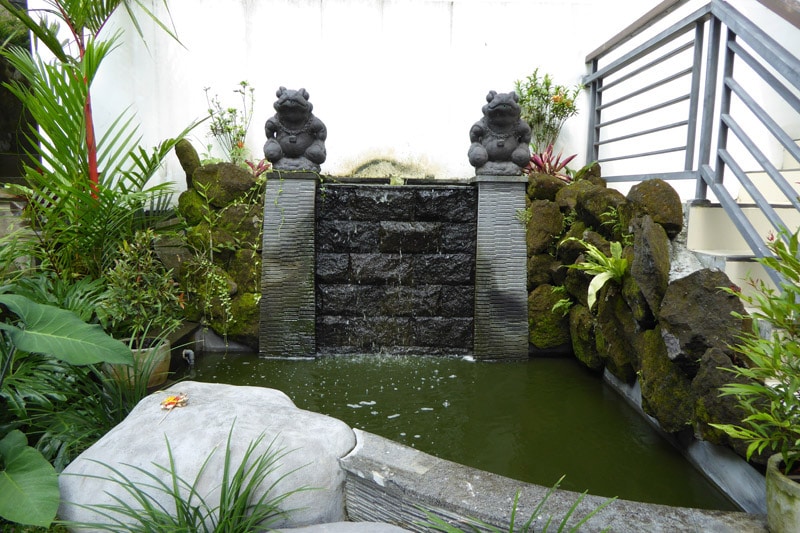
Water fountain at the entrance
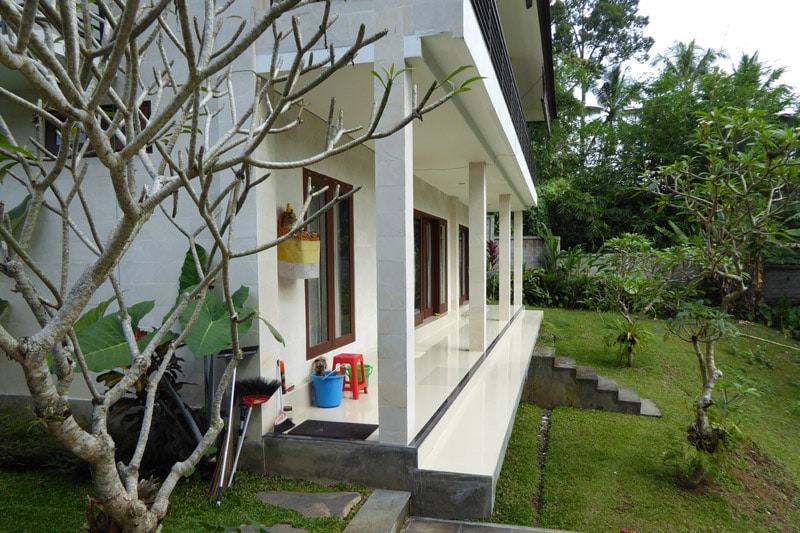
The ground floor where the owner stays. I stayed on the 2nd floor.
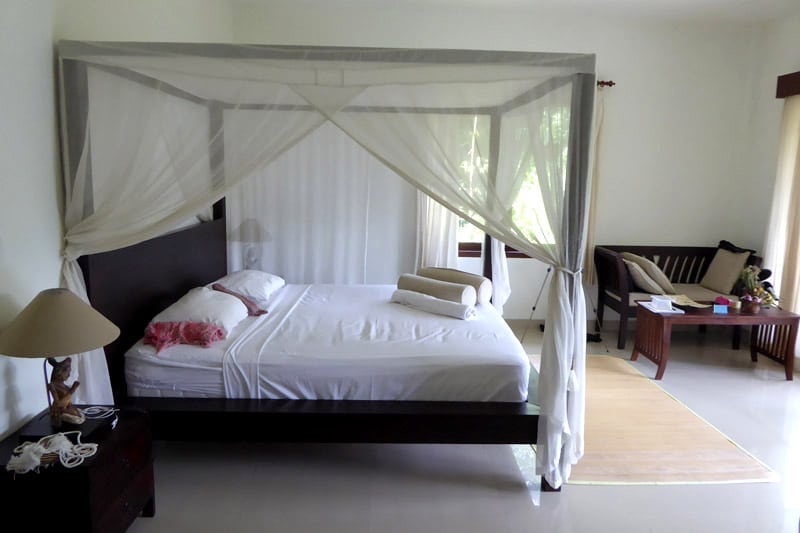
The bedroom/living room (the mini-bolster on the pillow is called Elmo; he’s been with me since I was born and goes everywhere with me when I travel 😅)
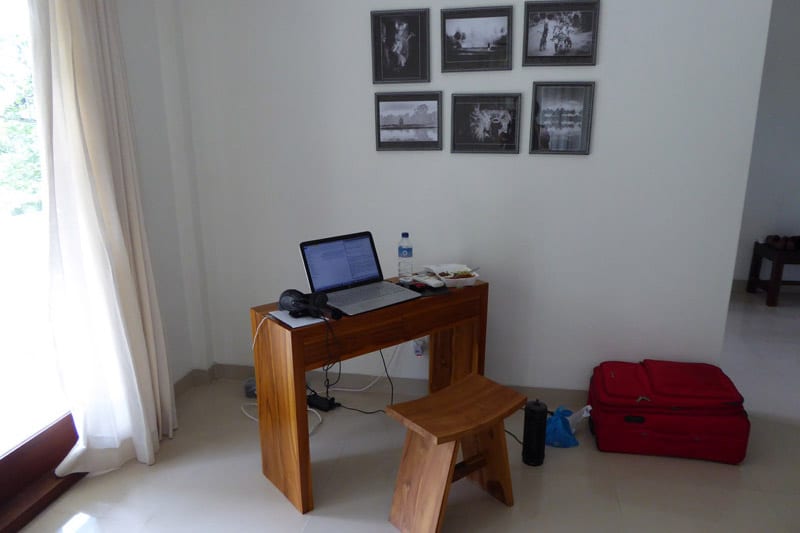
Work desk. I would have preferred a bigger desk for podcasting but this was enough to get my writing done.
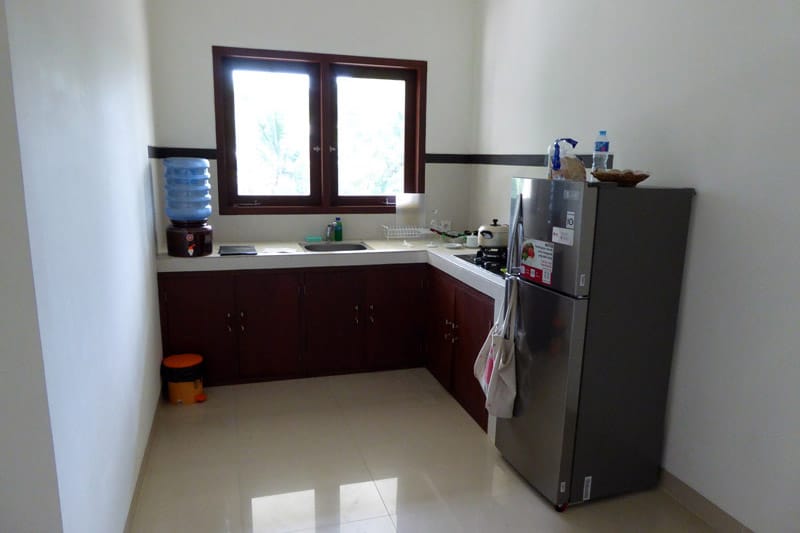
Kitchen. I ended up doing a fair bit of cooking in my later weeks because it’s difficult to get out when you can’t ride a scooter. I was living in the countryside, about 6km away from Ubud Center.
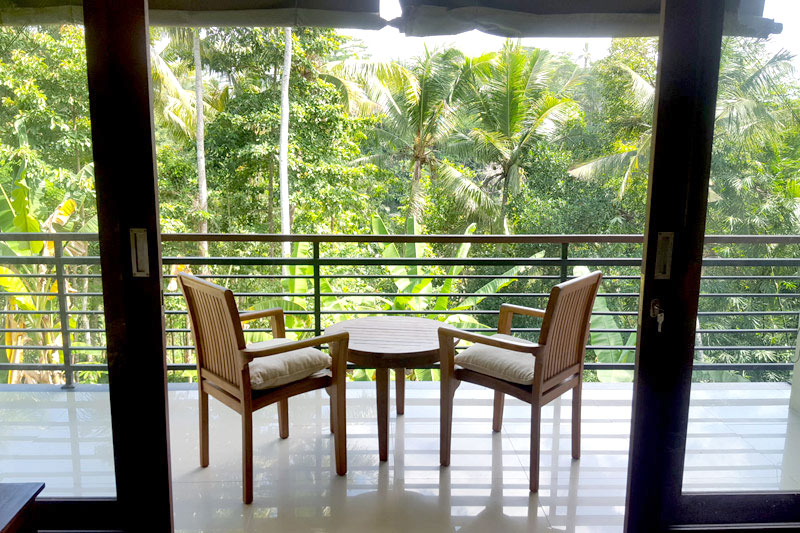
Balcony with a great view
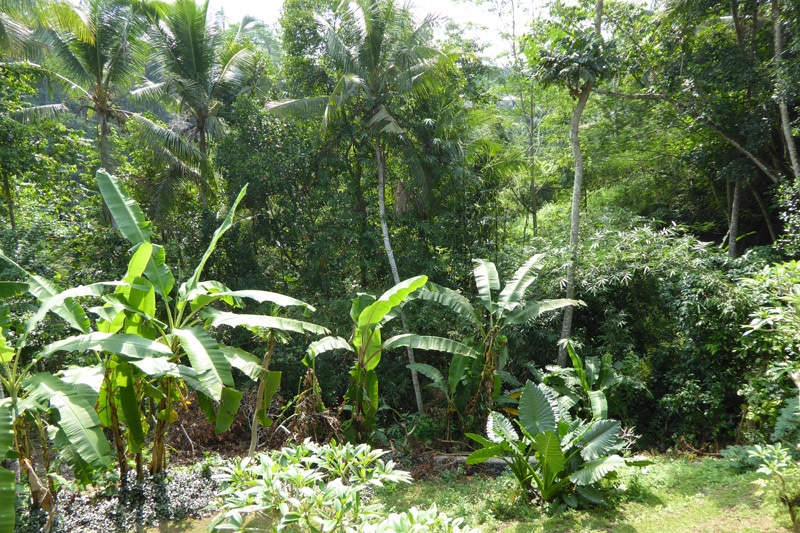
Nice forest view with lots of nature sounds
For those of you new to Airbnb, it’s a website to find good lodging without break-neck hotel prices. Registration is free and you only pay when you book. With 4 million listings in 191 countries (as of 2017), you’ll definitely be able to find something no matter where you’re going! I used Airbnb when I was at New York City for two months in 2011, and it’s thanks to Airbnb that Ken and I could secure last-minute accommodation when we went to Edinburgh for our pre-wedding photoshoot. Whether you are looking for a low-budget option or a high-end suite at good prices, Airbnb has that. In fact, Airbnb is giving hotels a run for their money.[5]
If you don’t have an Airbnb account, register under my link here (aff) and you will immediately get a USD 30 free credit that you can use for your next booking. This offer is only valid while Airbnb is offering it, so register for your account first to lock in your free USD 30 credit lest they stop or change the referral bonus next time. There is no expiry and you can use the credit any time you travel.
Accommodation (for 2018)
For my 2018 visit, I booked a place in Ubud Center because I wanted to be right where all the vegan restaurants are. During my 2016 stay in the countryside, I felt annoyed by the difficulty in getting to Ubud Center after a while and felt that I was held “hostage” by my homeowner and private drivers who would charge heightened rates for transport into town. If I was staying for a few days it wouldn’t be an issue, but since I was staying for a month the costs became quite unreasonable. Living far away wouldn’t be a problem if I could ride the scooter, but I can’t.
For my 2018 place (booked through Airbnb again), it was a simple one-bedroom unit, an attached bathroom, a balcony, a work desk, and a chair. It was simple and served my needs. After some negotiation and because it was the low-peak season, I was able to get 238k rupiah (USD 16) per night for 16 nights (and paid an extra 11+% for Airbnb fees). I subsequently extended for another 8 nights at 200k rupiah (USD 14) per night. Because I liaised with the owner directly for my extension, I avoided paying the extra Airbnb fees.
Overall, I’d say that there are pros and cons to staying in Ubud Center vs. the countryside. In the countryside, you are in a world of your own. Great nature, serenity, quiet. However, it’s difficult to get to Ubud Center unless you ride the scooter. My accommodation in Ubud Center is great too, a lot of nature sounds, scenery, and limited traffic noises. However, it was irritating to get around after a while as you would be constantly solicited with services every 30 seconds (“Taxi? Massage?”), and the air pollution is terrible with vehicle fumes and people smoking. The air quality was fine at my accommodation in Ubud Center; it was only the streets that were a problem.
Ubud Center is basically a commercial center targeted at tourists — locals don’t come here unless they run some business here. The best scenario is to stay in the countryside and rent a scooter to wherever you need. If you can’t ride a scooter, get a quiet lodging very near the places/restaurants you want to frequent, so you can minimize walking and breathing in bad air. Or bring a mask so you can wear it while walking around the town area.
Airport Pickup
Besides lodging, I also booked airport pickup. Most Ubud Airbnb hosts offer airport pickup for a fee. This is helpful since homes here are hard to find and there is no official or reliable transport.
The standard rate that Ubud Airbnb hosts will quote for a one-way ride is 350k rupiah or USD 26. (This is the same in 2016 and 2018.) Some greedy homeowners may try to quote you 400k rupiah — reject them. The “official” rate if you book airport transport in Ubud Center (after you reach Ubud) is actually 300k rupiah from Ubud to the airport.
Before booking your place, ask your host for the price for a one-way airport transfer first. Then, negotiate the price for a two-way transport. You really shouldn’t pay more than 300k rupiah per ride because this is the standard rate, but hey, I also recognize that you are likely at the mercy of their quoted fees. By negotiating for a two-way transport first, I managed to get the price down to this rate (600k rupiah or USD 45 for a two-way transfer) for my 2018 trip.
While 300-350k rupiah is more expensive than alternate forms of transport (such as haggling with freelance drivers), I recommend getting direct transport with the host because it’s just easier. Lanes in Ubud can be confusing and poorly marked, and getting a random driver may result in time lost as you guys drive in circles trying to find the place. If you are a single female traveler, you have to worry if the driver is going to try anything funny if you don’t give him the rate he originally asked for. I read a story of a female blogger whose Bali driver took two hours (rather than an hour as it should) to drive her to her destination because she haggled a low rate with him. Throughout the ride, he kept asking her if she was single, if she could please pay him more, etc. o_O
By booking transport with the host, you know that this person is verified with Airbnb. Booking direct transport got me safely to my accommodation each time after a 1hr 15-30 min ride. Similarly, booking direct transport for my return flight meant not having to worry about getting transport on the day of departure and focusing on packing.
If you prefer to get a cab from the airport, you should be able to negotiate a 300k rupiah fee (or less) from the airport to Ubud. The ride is about 1-2 hours depending on traffic. If you’re going to Kuta/Seminyak, the rate should be much cheaper as Ubud is further away from the airport.
Read Part 2: Living in Ubud, Environment: Nature, Climate, Villages, and Animals
This is part 1 of a 5-part travel series on Ubud where I share things to note as a foreigner living in Ubud and how to make the best out of your trip here.
- Part 1: Living in Ubud Series: Introduction, Visa, Accommodation
- Part 2: Environment: Nature, Climate, Villages, Animals
- Part 3: Transport: Scooters, Taxis, Go-Jek
- Part 4: Food: Vegan & Vegetarian Restaurant Reviews
- Part 5: Others: Insects, Language, Internet Speed, and More (Conclusion)
(Images: Bali map; All other images © Personal Excellence)









 Thanks for reading. If you like my free articles, join my private email list and get my latest updates and articles sent right to your inbox.
Thanks for reading. If you like my free articles, join my private email list and get my latest updates and articles sent right to your inbox.